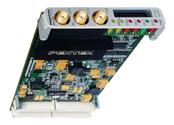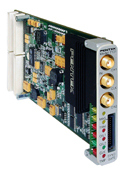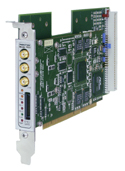Software radio boards support Linux
Dec 1, 2003 — by LinuxDevices Staff — from the LinuxDevices Archive — views Digital signal processing (DSP), software radio, and data acquisition system board vendor Pentek says it has released Linux drivers for two of its software radio boards, the first in a series of boards that will support Linux. Pentek's Linux drivers support both PCI and PCI Mezzanine Card (PMC) form-factor boards under Linux kernel 2.4, and are released under the GNU Public License (GPL).
Digital signal processing (DSP), software radio, and data acquisition system board vendor Pentek says it has released Linux drivers for two of its software radio boards, the first in a series of boards that will support Linux. Pentek's Linux drivers support both PCI and PCI Mezzanine Card (PMC) form-factor boards under Linux kernel 2.4, and are released under the GNU Public License (GPL).
The drivers
According to Pentek, the drivers provide developers “complete access to the capabilities of the hardware.” It says they were created to support the “many Linux applications” that are emerging for image, audio, voice, and signal intelligence processing in high-performance embedded products.
Pentek says its Linux drivers are designed to reduce development time not only during the initial stages of software development, but also when new I/O hardware is added to the system. Each driver is designed to control the specific hardware features of the I/O interface being used. As a bonus, these drivers are built with a consistent style and parameter naming convention, according to Pentek, so that similar parameters on different I/O modules have nearly identical driver calls. This greatly shortens the application development learning curve when a system is modified or expanded.
Pentek calls the new Linux drivers “Model 4994,” and says they work with either its Model 7631 PCI board or its Model 7131 PCI Mezzanine Card (PCM) module. Both hardware products are 16-channel digital receivers with two analog/digital converters and user-programmable Virtex-II FPGAs (Field Programmable Gate Arrays).
The boards
 Pentek's software radio PCI board and PCM module can now be used in Pentium/PowerPC based Linux PCs and single board computers (SBCs), respectively, for telecom, signal intelligence, radar, and satellite communications applications, according to Pentek.
Pentek's software radio PCI board and PCM module can now be used in Pentium/PowerPC based Linux PCs and single board computers (SBCs), respectively, for telecom, signal intelligence, radar, and satellite communications applications, according to Pentek.
The Model 7131 is a PMC module that can be attached to any processor board with one or more PMC sites. The same features and resources offered by the 7131 PMC module have been adapted to the Model 7631 PCI board, enabling use in commodity PCs, according to Pentek.
Both module and board feature two 105 MHz 14-bit A/D converters, plus four quad digital downconverters. They are coupled with FPGA technology to deliver one of the densest and most flexible boards in software radio today, according to Pentek.
 Both devices accept two analog inputs on front-panel SMA connectors, either from baseband HF sources or IF outputs from communications receivers. Both inputs are transformer-coupled to Analog Devices AD6645 14-bit A/D converters capable of operating at sampling rates up to 105 MHz. Four Texas Instruments/Graychip GC4016 quad digital receivers accept samples from both A/Ds. Each of the 16 receiver channels can be independently tuned to center frequencies from DC to 40 MHz with output bandwidths ranging from 4 kHz to 2.5 MHz. A special channel-combining mode boosts the bandwidth to 10 MHz to handle new wideband modulation signals.
Both devices accept two analog inputs on front-panel SMA connectors, either from baseband HF sources or IF outputs from communications receivers. Both inputs are transformer-coupled to Analog Devices AD6645 14-bit A/D converters capable of operating at sampling rates up to 105 MHz. Four Texas Instruments/Graychip GC4016 quad digital receivers accept samples from both A/Ds. Each of the 16 receiver channels can be independently tuned to center frequencies from DC to 40 MHz with output bandwidths ranging from 4 kHz to 2.5 MHz. A special channel-combining mode boosts the bandwidth to 10 MHz to handle new wideband modulation signals.
Both boards feature user-programmable Virtex-II FPGAs. Pentek's GateFlow FPGA Resources include the GateFlow FPGA Design Kit supporting customer-developed FPGA algorithms, the GateFlow IP Core Library for high-performance FFTs (Fast Fourier Transform), digital receivers, and radar pulse compression algorithms, and GateFlow Factory Installed IC Cores so customers can take immediate advantage of FPGA technology with zero FPGA development effort, according to Pentek.
Just the beginning
“Due to dramatic gains in clock speeds, many real-time signal processing tasks formerly handled by DSPs are now migrating to workstation processors. These platforms are much less expensive and Linux is gaining significant ground as the operating system (OS) of choice for several good reasons,” said Pentek vice president Rodger Hosking. “Engineers can scale the Linux kernel to minimize unnecessary overhead, customize OS functions for special needs and often save significant runtime licensing costs. Our new Linux drivers allow customers to realize all of these benefits for two of our most popular software radio products.”
Pentek emphasizes that the software radio boards are only the first in a series of Pentek boards that will enjoy Linux support. The company has worked with Linux in the past, but only on the host side. It's SwiftNet product, for example, supports debugging of DSP targets over Ethernet from Linux hosts, even where the target DSP lacks a TCP/IP stack.
Pricing & Availability
The Model 4994 Linux v2.4 kernel drivers are immediately available for the Pentek Model 7631 PCI and Model 7131 PMC modules. Linux driver support starts at $1,500. A one-year subscription is also available for $2,500.
This article was originally published on LinuxDevices.com and has been donated to the open source community by QuinStreet Inc. Please visit LinuxToday.com for up-to-date news and articles about Linux and open source.